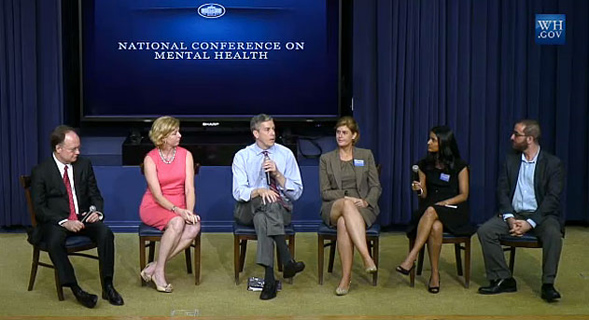Lessons From Combat
Dr. Heidi Kraft, an SDSU psychology instructor, spoke at the White House about classes shes teaching for veterans and the community.

It was Thursday afternoon on May 30. Dr. Heidi Kraft had just arrived at Camp Lejeune, North Carolina to speak to a group of Navy doctors and nurses when she got the call.
It wasn’t just any call — it was one from the White House — inviting her to be a guest of President Barack Obama’s and speak at the National Conference on Mental Health in Washington, D.C on June 3.
Kraft, who is co-instructing courses through the Department of Psychology at San Diego State University for veterans, their families and the community, was asked to be a part of a greater discussion on mental illness.
She was among health care experts, psychologists, faith leaders, advocates for veterans and administration officials, all of whom are working toward reducing mental health stigma and helping the millions of Americans struggling with mental illness.
Bridging efforts
At the conference, Kraft, an SDSU/UCSD Joint Doctoral Program in Clinical Psychology alumnae and Operation Iraqi Freedom veteran, spoke about the class she is teaching this summer. Aimed at helping people better understand veteran experiences in the U.S. Armed Forces, the class focuses on both positive and negative aspects of combat and what lies ahead mentally and emotionally post-combat trauma.
“The course was championed by the psychology department and the Joint Doctoral Program in Clinical Psychology at UCSD and SDSU. It has been embraced by the scientific and student veteran communities alike as an important step in the bridging of efforts to help San Diego State’s veteran students feel included and understood,” Kraft said during her remarks at the White House.
At the conference, the Obama Administration also announced the launch of a new website aimed at providing resources for those suffering from mental illness.
From battle to books
Many veterans who have fought in Iraq and Afghanistan suffer from combat stress injuries, including post-traumatic stress disorder (PTSD). Many more feel isolated and misunderstood upon their transition to civilian life including adapting to college life.
The two-course series, which began May 22 and runs to July 3, also focuses on enlightening SDSU’s student community on the experiences their fellow student veterans might have had in the military, especially those who have been in combat. The concentration on trauma and stress in the class specifically addresses the way trauma is manifested in the body and mind as well as coping strategies for managing stress associated with traumatic events.
Kraft, who deployed to Iraq as a clinical psychologist in 2004 and Dr. Barbara McDonald, an SDSU psychology lecturer, co-instruct the classes.
Kraft has helped deployed marines process combat stress injuries with the goal of post-trauma growth. She documented her experiences as part of a Marine Corps surgical company, in her book entitled “Rule Number Two: Lessons I learned in a Combat Hospital.”
Life lessons
Part one of the series is PSY496: Stress and Trauma, which defines the basics of stress, what causes it and how and why people respond to it differently. The class informs students about what can be done to prevent stress or reduce its effects.
The second part, PSY496: Psychological Experience of Combat, takes a look back at the evolution of the warrior and examines combat stress injuries and both the positive and traumatic aspects of combat. It takes a deeper look at how PTSD develops and current treatments available for those suffering from it.
Designed to be taken concurrently, the courses were open to SDSU students and the general public through the Open University Program in the College of Extended Studies.
A university, a center and a home
SDSU is home to the Joan and Art Barrons Veterans Center, which serves approximately 1,200 veterans, reservists and active duty as well as their dependents. The center assists these demographics with applying to the university, utilizing military benefits, finding housing and searching for jobs.
SDSU’s Veterans House, the nation's only on-campus housing facility exclusively for veterans, offers a unique on-campus living experience for students. The co-ed complex is available to SDSU students who are members of the Student Veteran Organization.



